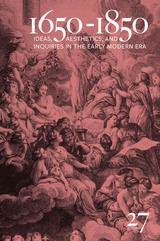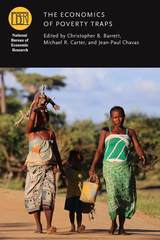2 books by Barrett, Chris

1650-1850
Ideas, Aesthetics, and Inquiries in the Early Modern Era (Volume 27)
Kevin L. Cope
Bucknell University Press, 2022
Rigorously inventive and revelatory in its adventurousness, 1650–1850 opens a forum for the discussion, investigation, and analysis of the full range of long-eighteenth-century writing, thinking, and artistry. Combining fresh considerations of prominent authors and artists with searches for overlooked or offbeat elements of the Enlightenment legacy, 1650–1850 delivers a comprehensive but richly detailed rendering of the first days, the first principles, and the first efforts of modern culture. Its pages open to the works of all nations and language traditions, providing a truly global picture of a period that routinely shattered boundaries. Volume 27 of this long-running journal is no exception to this tradition of focused inclusivity. Readers will travel through a blockbuster special feature on the topic of worldmaking and other worlds—on the Enlightenment zest for the discovery, charting, imagining, and evaluating of new worlds, envisioned worlds, utopian worlds, and worlds of the future. Essays in this enthusiastically extraterritorial offering escort readers through the science-fictional worlds of Lady Cavendish, around European gardens, over the high seas, across the American frontiers, into forests and exotic ecosystems, and, in sum, into the unlimited expanses of the Enlightenment mind. Further enlivening the volume is a cavalcade of full-length book reviews evaluating the latest in eighteenth-century scholarship.
[more]

The Economics of Poverty Traps
Edited by Christopher B. Barrett, Michael R. Carter, and Jean-Paul Chavas
University of Chicago Press, 2018
What circumstances or behaviors turn poverty into a cycle that perpetuates across generations? The answer to this question carries especially important implications for the design and evaluation of policies and projects intended to reduce poverty. Yet a major challenge analysts and policymakers face in understanding poverty traps is the sheer number of mechanisms—not just financial, but also environmental, physical, and psychological—that may contribute to the persistence of poverty all over the world.
The research in this volume explores the hypothesis that poverty is self-reinforcing because the equilibrium behaviors of the poor perpetuate low standards of living. Contributions explore the dynamic, complex processes by which households accumulate assets and increase their productivity and earnings potential, as well as the conditions under which some individuals, groups, and economies struggle to escape poverty. Investigating the full range of phenomena that combine to generate poverty traps—gleaned from behavioral, health, and resource economics as well as the sociology, psychology, and environmental literatures—chapters in this volume also present new evidence that highlights both the insights and the limits of a poverty trap lens.
The framework introduced in this volume provides a robust platform for studying well-being dynamics in developing economies.
The research in this volume explores the hypothesis that poverty is self-reinforcing because the equilibrium behaviors of the poor perpetuate low standards of living. Contributions explore the dynamic, complex processes by which households accumulate assets and increase their productivity and earnings potential, as well as the conditions under which some individuals, groups, and economies struggle to escape poverty. Investigating the full range of phenomena that combine to generate poverty traps—gleaned from behavioral, health, and resource economics as well as the sociology, psychology, and environmental literatures—chapters in this volume also present new evidence that highlights both the insights and the limits of a poverty trap lens.
The framework introduced in this volume provides a robust platform for studying well-being dynamics in developing economies.
[more]
READERS
Browse our collection.
PUBLISHERS
See BiblioVault's publisher services.
STUDENT SERVICES
Files for college accessibility offices.
UChicago Accessibility Resources
home | accessibility | search | about | contact us
BiblioVault ® 2001 - 2024
The University of Chicago Press









